 Por Federica Bordaberry
Por Federica Bordaberry
federicaborda
"Creo que estar solo está sobrevalorado, pero ese soy yo", dice Ariel Pink (1978) el músico californiano al que han tildado de padrino del pop hignagógico, en conversación con LatidoBEAT.
Dice eso, a pesar de haber acumulado entre 200 y 300 cintas de casete durante los primeros años de su carrera, donde grababa solo con un home studio. Por esos años, ya había abandonado CalArts, la universidad a la que había ido a estudiar Bellas Artes, vivía en un áshramhindú, un monasterio en pleno Los Ángeles, consumía muchísimas drogas, comenzaba a estudiar música y trabajaba en una tienda de discos.
Según declaró el propio Ariel Pink a LA Weekly, su primer disco The Doldrums (publicado en 1999) fue hecho durante su último semestre en la universidad es "el disco más triste que pude haber hecho". Es que al principio, la soledad estuvo muy presenta.
Pero, a partir del 2006, junto con John Maus, Gary War y Geneva Jacuzzi, su proyecto pasó a ser de banda y a llamarse Ariel Pink's Haunted Graffiti. Fue, de hecho, el nombre de la banda el que le costó su nombre de solista Ariel Pink.
El propio Pink explicó que fue un error de nomenclatura que cometieron los propios productores, ya que dieron por supuesto que el nombre de la banda era "Haunted Graffiti", en vez de "Pink's Haunted Graffiti".
A esta altura, con 20 discos entre recopilaciones y discos de estudio, entre su proyecto solista y de banda, Ariel Pink se volvió un referente del movimiento chillwave y una influencia para los músicos indie por su estética lo-fi, su música hecha con home studio y su prolongación de la cultura del casete, los 70 y los 80 norteamericanos.
En 2012, Ariel Pink se apareció con su banda en Montevideo por primera vez, en La Trastienda Club. De esa fecha, se recuerda que salió a cantar con short de jean, camisa colorida, mocasines y una media de cada color.
Doce años de aquella situación, Pink vuelve a Montevideo para presentarse en Montevideo el 18 y 19 de mayo en el Bluzz Bar (Canelones 760), con la banda Incluso si es un Susurro Soviético como invitado especial (entradas acá).
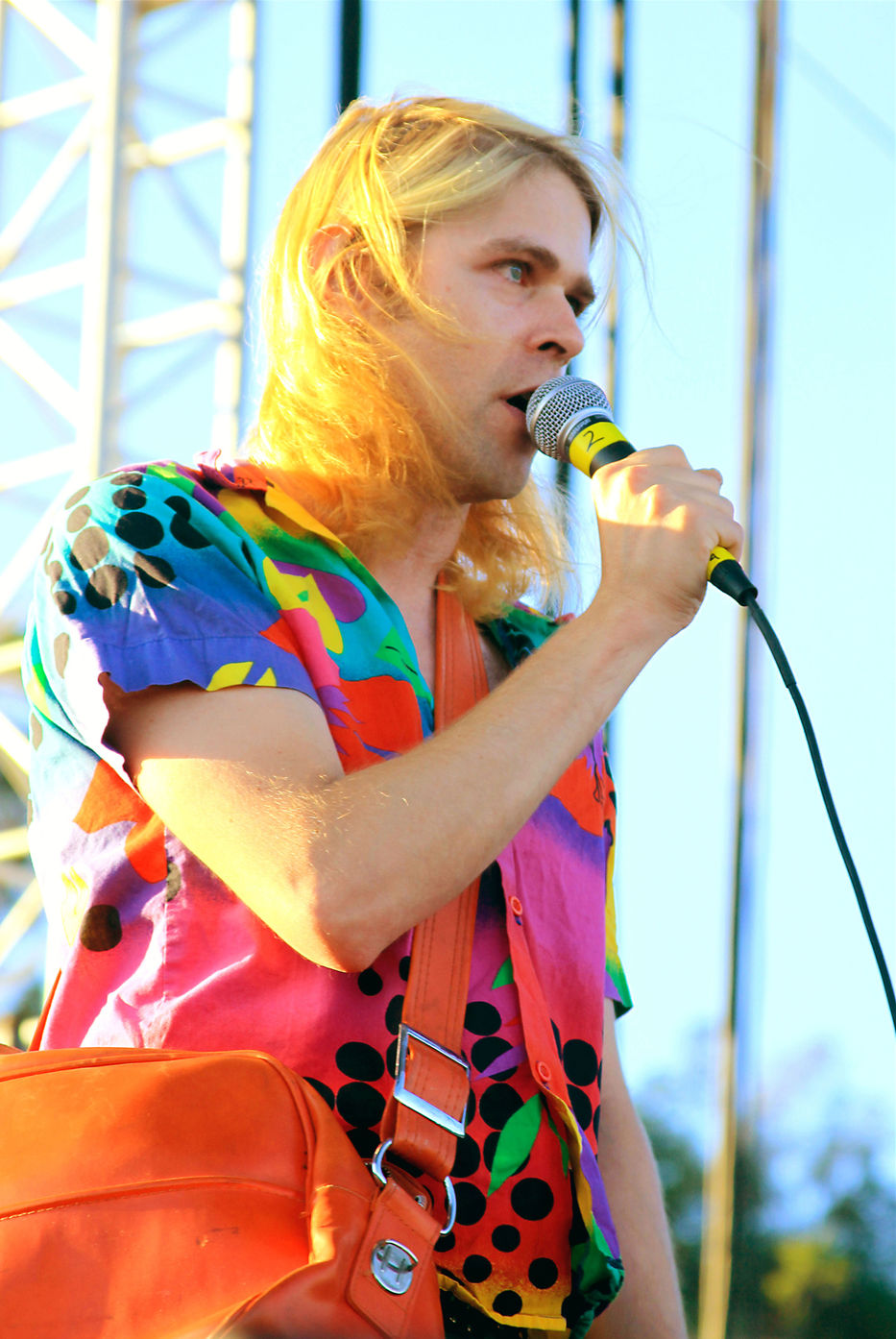
Foto: Dustin Drew
Con tanto hecho y grabado, ¿qué papel ha jugado la soledad en tu música?
Supongo que era necesario, inicialmente. Cuando era más joven, hacía muchas cosas solo, la mayor parte de mi trabajo era solo y tenía que probarme a mí mismo un poco, supongo. Pero después ya no me sentí tan solo. He sido aceptado de muchas maneras y absorbido por la cultura de muchas maneras, y también de una manera influyente. Por lo tanto, ya no siento que pueda afirmar que estoy tan solo, excepto por el hecho de que estoy totalmente solo.
En cierto sentido, todos lo estamos.
Supongo, pero realmente me siento bastante anacrónico. Pero sí, supongo que sí. Siempre me he sentido así.
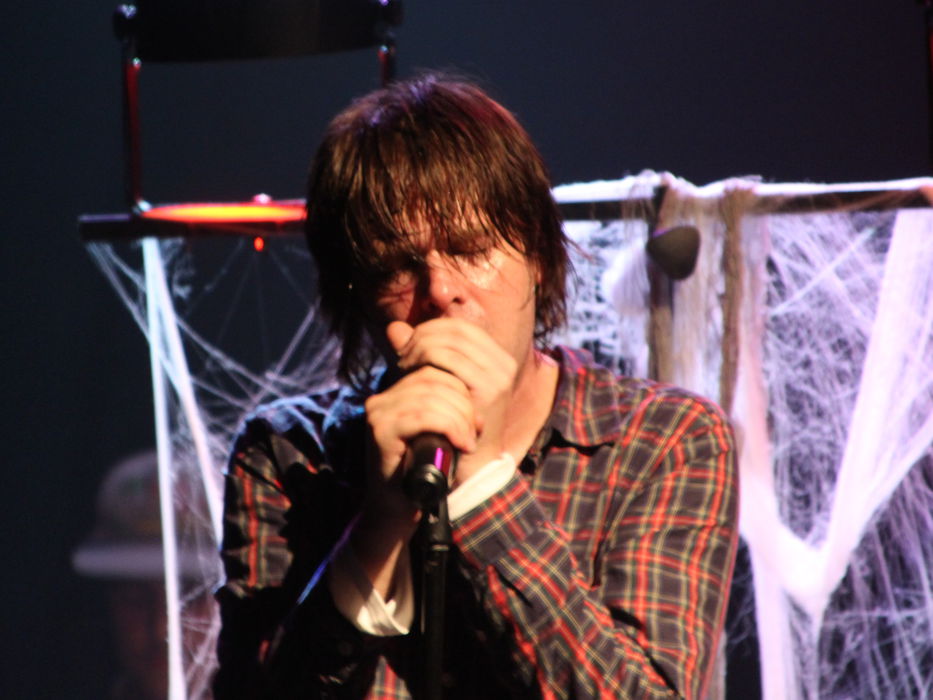
Foto: Julio Enriquez de Denver, CO, EEUU (2017)
¿Existe un vínculo entre la soledad, la libertad y la música, en tu caso?
Bueno, no creo que sea el objetivo. No es realmente un objetivo, es algo que sucede de forma bastante natural si hacés las cosas de manera diferente. A veces puede que no estés tan solo como creés. Creo que estar solo está sobrevalorado, pero ese soy yo.
Yendo a un sentido más general, ¿ves algún vínculo entre la soledad y la composición, por ejemplo?
No sé, no puedo hablar por nadie más. Personalmente, me encanta trabajar con la gente y de innumerables maneras. Estoy seguro de que, probablemente, tenga que ver con el hecho de que soy sociable y vivo en una ciudad muy social, supongo. Pero, sí, para alguien de mi edad, creo que probablemente soy más sociable de lo que necesito ser.
Bastante seguido se te cita como el "padrino del pop hipnagógico y los movimientos chill wave", ¿te ves así?
Bueno, no lo planeé. Yo no inventé esos términos y no me vi a mí mismo como un ejemplo de ese tipo de música, inicialmente. Por lo tanto, creo que tan seguido como sea posible, diría yo.
¿Qué sentís cuando ves ese tipo de etiqueta en ti?
Creo que pueden inventar tantas etiquetas como quieran. Eso es bueno. Cuantos más, mejor. No beneficia mis objetivos personales ni nada por el estilo. No me siento limitado por cómo me llaman los demás y no siento que me importe mucho. Entonces, estoy contento con lo que la gente obtenga de él, si les gusta es genial. Pueden llamarlo como quieran, ni siquiera me importa.
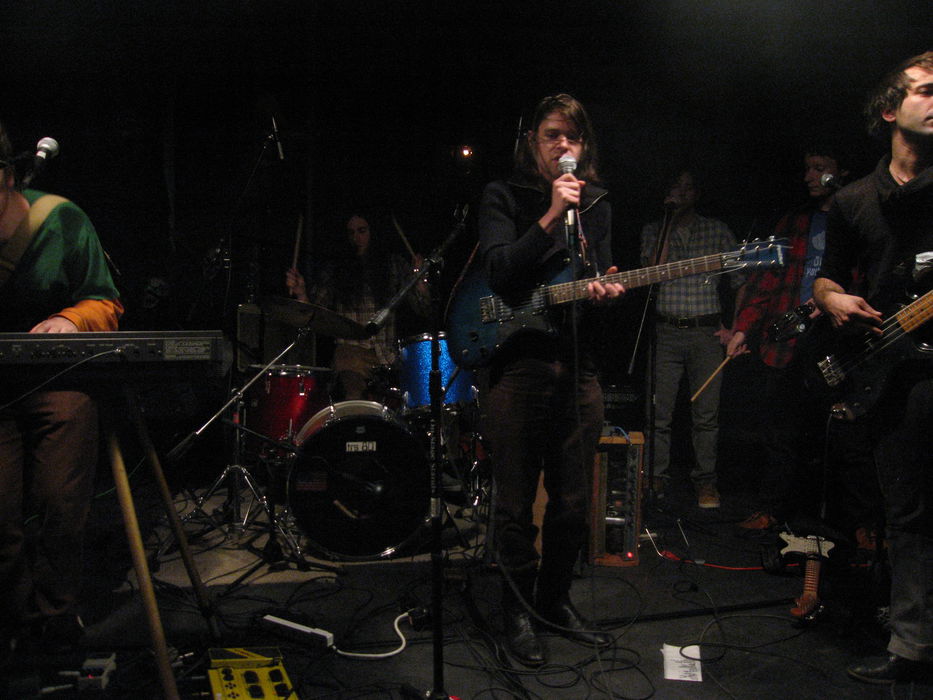
Foto: Adrigu (2007)
Tú mismo has dicho que tu progreso musical no es lineal, ¿qué es, entonces?
Tal vez quise decir que no es progresivo o no es vertical, sino más horizontal. Está más a un lado, por lo que los mismos estándares no se aplican realmente a mí. Eso es lo que quise decir. Para mí, tengo una especie de trayectoria en mi universo y realmente no tiene nada que ver con la relevancia o los tiempos, ni nada por el estilo. Siento que hago cosas y es solo una estética personal, supongo.
¿Qué haces ahora, en términos de composición, que no hacías cuando eras más joven?
No mucho, ¿sabés? Más o menos he tenido la misma tarea, el mismo objetivo. Lo que me impulsa es tratar de darme cuenta de lo que me viene en la cabeza, y he tenido que hacerlo de la manera más eficiente posible, así que con el tiempo eso mejora de alguna manera, supongo, pero en muchos sentidos no. Una vez más, el progreso hacia la realización de lo que está en mi cabeza tampoco es lineal, es un experimento y no necesariamente está mejorando, es algo que está cambiando. Está cambiando en una dirección no progresiva, podría estar degenerando, no lo sé.
¿Y en el escenario?
No, me gustaría pensar que estoy mejorando. Pero, al mismo tiempo, a nivel personal, sé que no depende de mí. La banda es tan buena como lo es la banda, y lo que estoy haciendo con la banda en el escenario es esencialmente tratar de realizar lo que hice en la cinta, en los discos, lo más fielmente posible. Así que, en ese sentido, eso es un desafío suficiente en sí mismo. Ecuanto a mí, si suena algo parecido a los discos, estoy haciendo mi trabajo.
Sos de la generación del casete y MTV, el primer MTV, ¿cómo ha afectado la era extremadamente digital a tu trabajo?
Claro que lo ha afectado, todo afecta mi trabajo de alguna manera. Mucho de lo que hago es resistirme a comprometerme con el mundo moderno, paso mucho tiempo cristalizando y congelando, aferrándome a un recuerdo en mi ser, que se cultivó hace mucho tiempo, tal vez cuando MTV comenzó, o lo que sea. Así que, en ese sentido, realmente estoy empujando contra las posturas del tiempo, que están destruyendo el recuerdo. Pero no sé, especialmente hoy en día, siento que estoy nadando contra la corriente.
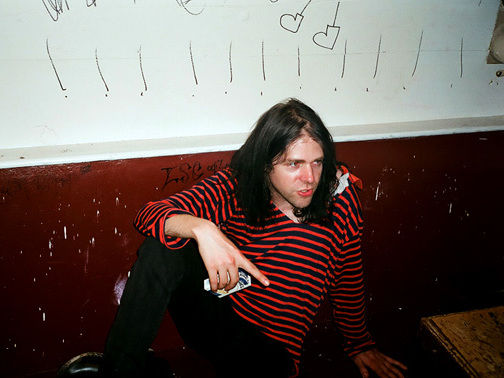
Foto: Stevenviney (2010)
______________________________________________________________________________________
Entrevista original en inglés:
With so many done and recorded, what role has solitude played in your music?
I guess it was necessary, initially. When I was younger, I did a lot of stuff alone, most of my work was alone and I sort to had to prove myself a little bit, I suppose. But then I didn't feel that alone anymore. I've been accepted in many ways and absorbed by culture in many ways, and also in an influential way as well. So, I don't feel like I can claim to be that alone anymore, except for the fact that I'm totally alone.
In a sense, we all are.
I suppose, but I really feel quite anachronistic, but yeah. I guess I do, I've always felt that way.
Is there a link between solitude, freedom and music, in your case?
Well, I don't think it's the goal, I think that it's obviously you'd be stored out alone, so it's not really a goal, it's something that happens quite naturally if you do things differently, that sometimes you might not be as alone as you think, I think that being alone is overrated, but that's just me.
Getting to a more general sense, do you see any link between solitude and composing, for example?
I don't know, I can't speak for anybody else, I personally love working with people and in countless different ways, I'm sure it probably has to do with the fact that I'm somewhat social and live in a very socialist town, I guess. But yeah, for somebody my age I think I'm probably more social than I need to be.
You are frequently cited as the “godfather of hypnagogic pop and chill wave movements”, do you see yourself as that?
Well, I didn't plan on it. I didn't invent those terms and I didn't see myself as an example of that kind of music, initially. So, I think that as often as possible, I would say.
What do you feel when you see that kind of label on you?
I think they can invent as many labels as they like. That's good, the more the merrier. It doesn't benefit my personal goals or anything like that. I don't feel limited by what other people call me and I don't feel like it matters that much to me. So, I'm happy with whatever people get out of it, if they like it's great. They can call it whatever they want, it doesn't even matter to me.
You yourself have said that your musical progress isn’t linear, what is it then?
Maybe I meant it's not progressive or not vertical, more horizontal. It's more to the side, so that the same standards don't really apply to me, that's what I meant. For me I have sort of a trajectory in my universe and it doesn't really have anything to do with relevance or the times, or anything like that. I feel very much like I do things and it's just a personal aesthetic, I suppose.
What do you do now, in terms of composition, that you didn’t do when you were younger?
Not much, you know? I pretty much have had the same task, the same goal, what drives me I try to realize what comes to me in my head, and I've had to do it as efficiently as possible, so with time that improves somehow, I suppose, but in many ways it doesn't. Again, the progress towards realizing what is in my head is not linear as well, it's an experiment and it's not necessarily getting better, it's sort of changing. It's changing in a non-progressive direction, it could be degenerating, I don't know.
And on stage?
No, I'd like to think that those are improving. But at the same time on a personal level, I know it is not up to me, the band is as good as the band is, and what I'm doing with the band on stage is essentially trying to realize what I did on tape, on the records, as faithfully as possible, so in that sense that is enough of a challenge in itself so, as for me, if it comes across as sounding anything like the records, I'm doing my job.
You are from the cassette and MTV, the first MTV, generation, how has the extremely digital era affected your work?
Sure, it has affected it, it all affects my work somehow. A lot of what I do is I resist engaging with the modern world, I spend a lot of time just sort of crystalizing and freezing, holding on to a memory in my being, that was cultivated long time ago, maybe when MTV first started, or whatever. So, in that sense I'm just really pushing up against the stands of time, which are shipping away memory. But I don't know, especially nowadays, I feel like I'm swimming up strait against the current.
______________________________________________________________________________________
 Por Federica Bordaberry
Por Federica Bordaberry
federicaborda
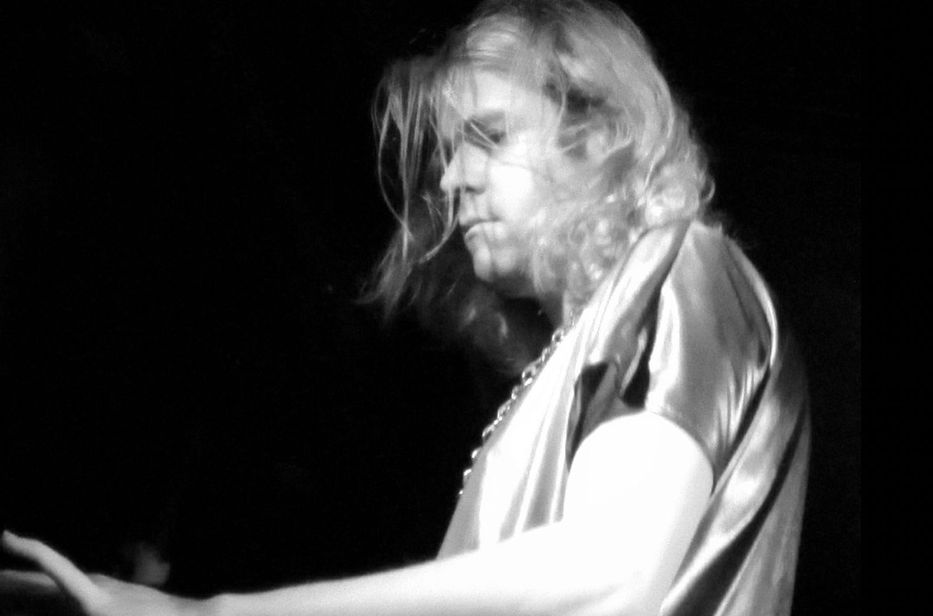

Acerca de los comentarios
Hemos reformulado nuestra manera de mostrar comentarios, agregando tecnología de forma de que cada lector pueda decidir qué comentarios se le mostrarán en base a la valoración que tengan estos por parte de la comunidad. AMPLIAREsto es para poder mejorar el intercambio entre los usuarios y que sea un lugar que respete las normas de convivencia.
A su vez, habilitamos la casilla reportarcomentario@montevideo.com.uy, para que los lectores puedan reportar comentarios que consideren fuera de lugar y que rompan las normas de convivencia.
Si querés leerlo hacé clic aquí[+]